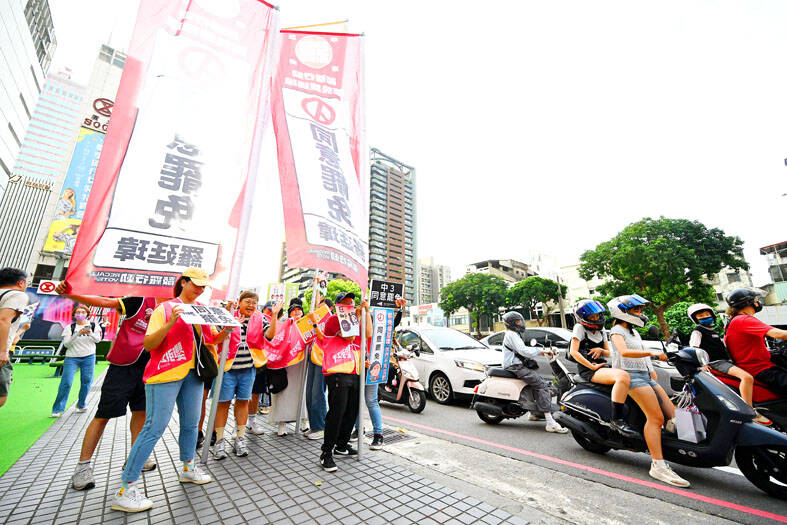The Central Election Commission (CEC) yesterday approved recall vote proposals against five more Chinese Nationalist Party (KMT) lawmakers, bringing the total number of recall elections to 31.
Voting on the five lawmakers — Lo Ming-tsai (羅明才), Yan Kuan-heng (顏寬恒), Yang Chiung-ying (楊瓊瓔), Johnny Chiang (江啟臣) and Lin Szu-ming (林思銘) — is scheduled for Aug. 23, the CEC said.
Per the Civil Servants’ Election and Recall Act (公職人員選舉罷免法), a recall campaign is valid if the number of yes votes exceeds the number of opposing votes, and if the supporting votes surpass one-quarter of the total eligible voters in the legislator’s electoral district.

Photo: Liao Yao-tung, Taipei Times
This is the second wave of recall campaigns against KMT lawmakers approved by the commission.
The first wave of recall campaigns targets 26 KMT legislators, including caucus whip Fu Kun-chi (傅崑萁), Huang Chien-pin (黃建賓), Wang Hung-wei (王鴻薇), Lee Yan-hisu (李彥秀), Lo Chih-chiang (羅智強), Hsu Chiao-hsin (徐巧芯), Lai Shyh-bao (賴士葆), Hung Meng-kai (洪孟楷), Yeh Yuan-chih (葉元之), Chang Chih-lun (張智倫), Lin Te-fu (林德福), Liao Hsien-hsiang (廖先翔), Liao Wei-hsiang (廖偉翔), Niu Hsu-ting (牛煦庭), Tu Chuan-chi (涂權吉), Lu Ming-che (魯明哲), Wan Mei-ling (萬美玲), Lu Yu-ling (呂玉玲), Chiu Juo-hua (邱若華), Huang Chien-hao (黃健豪), Lo Ting-wei (羅廷瑋), Cheng Cheng-chien (鄭正鈐), Ting Hsueh-chung (丁學忠) and Lin Pei-hsiang (林沛祥).
The recall vote for these 24 legislators is scheduled for Saturday.
Meanwhile, voting about Nantou County KMT legislators Ma Wen-chun (馬文君) and Yu Hao (游顥) is to take place on Aug. 23, alongside the recall elections on five other KMT lawmakers.
The average cost to process a single legislator recall case ranges between NT$16 million and NT$20 million (US$544,107 to US$680,133), and the total cost for holding 31 recall elections would amount to NT$620 million, the CEC said.
The government would also incur costs of NT$1.1 billion for a referendum on restarting the Ma-anshan Nuclear Power Plant, meaning the total cost for the upcoming polls, including the recall votes and the referendum, would amount to NT$1.7 billion, it said.
The referendum is to be held on Aug. 23 alongside the recall votes.
Additional reporting by CNA

MAKING WAVES: China’s maritime militia could become a nontraditional threat in war, clogging up shipping lanes to prevent US or Japanese intervention, a report said About 1,900 Chinese ships flying flags of convenience and fishing vessels that participated in China’s military exercises around Taiwan last month and in January have been listed for monitoring, Coast Guard Administration (CGA) Deputy Director-General Hsieh Ching-chin (謝慶欽) said yesterday. Following amendments to the Commercial Port Act (商港法) and the Law of Ships (船舶法) last month, the CGA can designate possible berthing areas or deny ports of call for vessels suspected of loitering around areas where undersea cables can be accessed, Oceans Affairs Council Minister Kuan Bi-ling (管碧玲) said. The list of suspected ships, originally 300, had risen to about 1,900 as

DAREDEVIL: Honnold said it had always been a dream of his to climb Taipei 101, while a Netflix producer said the skyscraper was ‘a real icon of this country’ US climber Alex Honnold yesterday took on Taiwan’s tallest building, becoming the first person to scale Taipei 101 without a rope, harness or safety net. Hundreds of spectators gathered at the base of the 101-story skyscraper to watch Honnold, 40, embark on his daredevil feat, which was also broadcast live on Netflix. Dressed in a red T-shirt and yellow custom-made climbing shoes, Honnold swiftly moved up the southeast face of the glass and steel building. At one point, he stepped onto a platform midway up to wave down at fans and onlookers who were taking photos. People watching from inside

Japan’s strategic alliance with the US would collapse if Tokyo were to turn away from a conflict in Taiwan, Japanese Prime Minister Sanae Takaichi said yesterday, but distanced herself from previous comments that suggested a possible military response in such an event. Takaichi expressed her latest views on a nationally broadcast TV program late on Monday, where an opposition party leader criticized her for igniting tensions with China with the earlier remarks. Ties between Japan and China have sunk to the worst level in years after Takaichi said in November that a hypothetical Chinese attack on Taiwan could bring about a Japanese

The WHO ignored early COVID-19 warnings from Taiwan, US Deputy Secretary of Health and Human Services Jim O’Neill said on Friday, as part of justification for Washington withdrawing from the global health body. US Secretary of State Marco Rubio on Thursday said that the US was pulling out of the UN agency, as it failed to fulfill its responsibilities during the COVID-19 pandemic. The WHO “ignored early COVID warnings from Taiwan in 2019 by pretending Taiwan did not exist, O’Neill wrote on X on Friday, Taiwan time. “It ignored rigorous science and promoted lockdowns.” The US will “continue international coordination on infectious